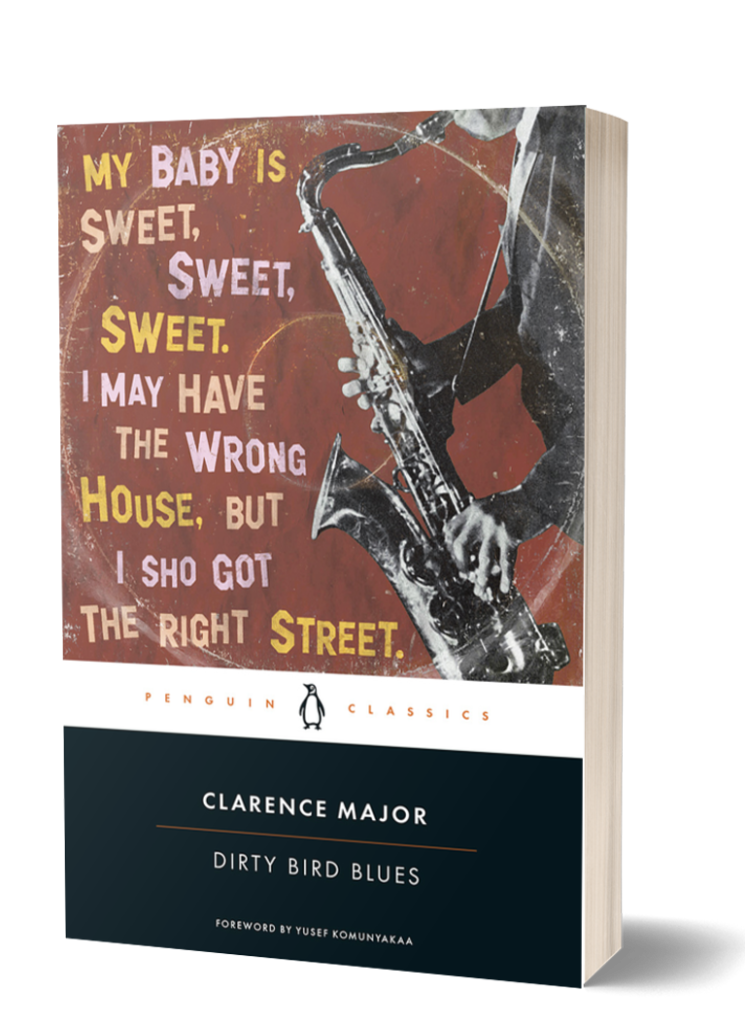Dirty Bird Blues
Foreword by Yusef Komunyakaa
Introduction by John Beckman
A quietly influential force in African American literature and art, Clarence Major makes his Penguin Classics debut with the twenty-fifth-anniversary edition of Dirty Bird Blues
Set in post-World War II Chicago and Omaha, the novel features Manfred Banks, a young, harmonica-blowing blues singer who is always writing music in his head. Torn between his friendships with fellow musicians and nightclub life and his responsibilities to his wife and child, along with the pressures of dealing with a racist America that assaults him at every turn, Manfred seeks easy answers in “Dirty Bird” (Old Crow whiskey) and in moving on. He moves to Omaha with hopes of better opportunities as a blue-collar worker, but the blues in his soul and the dreams in his mind keep bringing him back to face himself. After a nightmarish descent into his own depths, Manfred emerges with fresh awareness and possibility. Through Manfred, we witness and experience the process by which modern American English has been vitalized and strengthened by the poetry and the poignancy of the African-American experience. As Manfred struggles with the oppressive constraints of society and his private turmoil, his rich inner voice resonates with the blues.
REVIEWS
“Dirty Bird Blues… The book’s folkloric street slang is pitch-perfect, and Major deserves much wider recognition for his career as a novelist, painter, poet and explainer of the Black experience in America. This is ultra realism at its finest.”
—Douglas Brinkley, New York Times Book Review
“Language is central to Dirty Bird Blues–how it echoes from the folk traditions Banks brought north from Georgia, how it bubbles up from the joys and sorrows of his own life, how African American speech continues to shape the majority dialect in ways today’s rappers have demonstrated all over again… Major excels at descriptions of manual labor–which at least was available in the 1950s for men without diplomas–and of the hard-pressed cohesiveness of the black community before civil rights laws but also before crack cocaine.”
—The Los Angeles Times (read)
“Major, a poet, novelist, and editor of such fine anthologies as The Garden Thrives, has been a quietly influential force in African American literature. No more. With this gorgeously bluesy tale of love, hate, and doing right, Major will take center stage … As Major traces his hero’s struggle to understand himself and control his demons, he thrills us with some of the wittiest, most melodious inner dialogue ever written and moves us with dramatic confrontations between loved ones that are remarkable for their sensitivity, authenticity, and significance.”
—Booklist (read)
“Major cleverly demonstrates the pervasive racism that’s part of the black experience. He’s a rhythmic writer with a good ear for the music of the American vernacular. Although the blues refrains that run through Man’s mind ring more calculated, and hence annoying, than true, the choices this flawed hero must make are compelling and weighty. The result is a novel that’s moving–and highly enjoyable.”
—Publishers Weekly, starred review (read)
“Major, a prolific man of letters, seems to have abandoned for good the experimental styles that characterized much of his early work. His latest is a quite conventional morality tale dressed up with his extensive, if somewhat academic, knowledge of Afro-American slang. The lexicographer in Major gets the better of him in an otherwise simple narrative about black life circa 1950 … There’s a powerful, persuasive use of language here, but it’s suspended in too studied a tale—one that never gets cooking.”
—Kirkus (read)




